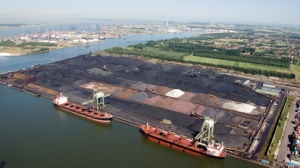


(Posted on 14/04/20)
The total freight volume handled by Port of Antwerp rose by 4.0% in the first quarter compared with the same period last year. The impact of the corona crisis remained limited in the first three months of the year.
The dry bulk volume at the end of the first quarter was slightly up, by 1.2%. During this period three times as much coal was handled than in the same period last year due to increased speculation in this commodity. In the meantime scrap metal experienced light growth, while other types of dry bulk such as fertilisers, ore and sand came under pressure and are trending down.
The vicissitudes of world trade since mid-2019 continue to weigh on the breakbulk volume. This has resulted in a total decline of 27.8%, with imports being hit harder than exports. The volume of iron and steel, the most important category in this segment, continued its negative trend with a contraction of 36.8%. The shutdown in the car trade inflicted a double blow on the breakbulk volume, with reduced steel imports on the one hand and an 18% drop in the number of new cars on the other. The total ro/ro volume was down by 20.3%.
With growth of 9.5% in TEU and 9.4% in tonnage the container trade remains by far the largest segment in the port of Antwerp. There was a noticeable increase in the amount of pharmaceuticals and e-commerce goods, and there was higher demand for long-life foodstuffs. With the exception of a slight decline in goods from the Far East (down 2.2%) all trading regions experienced strong growth.
Liquid bulk for its part held steady, only slightly down by 0.7% due mainly to slower economic growth and fluctuating oil prices. The volume of chemicals experienced growth of 4%. Oil derivatives for their part were up by 1.3% while crude oil by contrast was down by 13.5% at the end of March.
A total of 3,476 seagoing ships called at Port of Antwerp in the first quarter of 2020, some 1.2% fewer than the first quarter of 2019. Their combined gross tonnage fell by 3.4% to 98 million tonnes.
The current pandemic is causing disruptions to production and supply chains around the world. Port of Antwerp is an international hub for the transport of goods and so will inevitably feel the effects of this. The impact of the crisis during the first quarter has remained fairly limited, but it will become apparent in the second quarter with cancelled departures, large sectors of industry such as the car industry in western Europe being shut down, and changing patterns of consumer behaviour.
At the moment, however, it is impossible to predict the final impact on the global economy and thus also the volume of freight passing through the port of Antwerp. Much will depend on how quickly industry is able to start up again and consumer confidence to return. Port of Antwerp together with Alfaport-Voka will continue to monitor the situation among port companies and to take any measures that may be necessary.
Abu Dhabi based AD Ports Group, a global enabler of integrated trade, transport, industry, and logistics... Read more
This year marks a significant milestone in maritime innovation as Port Hedland, Australia, celebrates... Read more
Associated British Ports (ABP), the UK’s leading port operator, has announced the latest tranche... Read more
During the Investment, Labour, and Trade Promotion Programme in Japan (November 16–22, 2025),... Read more
AD Ports Group subsidiary Khalifa Economic Zones Abu Dhabi - KEZAD Group, the largest operator of integrated... Read more
Abu Dhabi based AD Ports Group, a global enabler of integrated trade, transport, industry, and logistics... Read more
Peel Ports Group has achieved a 48% reduction in operational greenhouse gas emissions in the last five... Read more
The Trois-Rivières Port Authority (TRPA) in Canada has announced the appointment of Mr. Anick... Read more
Euroports commitment to continuously improving operational efficiency, enhancing workplace safety, and... Read more
Under the slogan ‘Your Intermodal Link Between China, Iberia and the Atlantic Markets,’... Read more